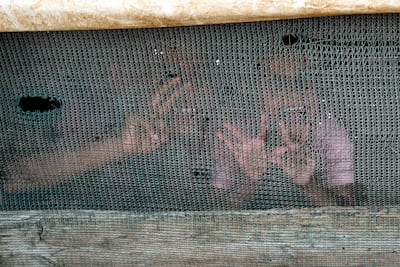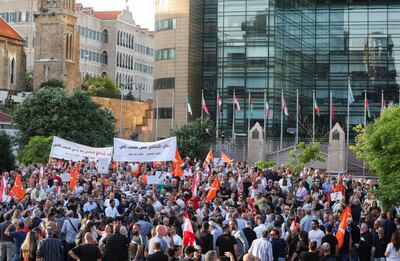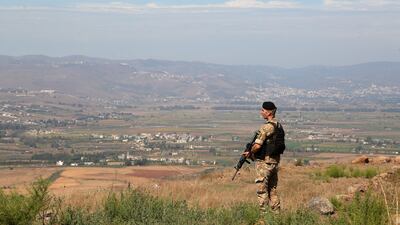Maher walks 3km to work every day, navigating Beirut's side streets and shadowy alleys to avoid detection. His journey is perilous, fraught with the constant fear of arrest and deportation.
At 6am, Maher kisses his eight children as they sleep, recites a small prayer, and slips out of his modest home in Beirut’s working-class neighbourhood of Sabra. Despite owning a motorbike, he avoids using it, knowing the risks that can be presented at the numerous vehicle checkpoints scattered throughout the city.
The 33-year-old Syrian knows that every time he steps out of his house, there is a possibility he may not return.
“I take my precautions,” he said. “But I’m always terrified.”
Statistically, there is more than an 83 per cent chance that a Syrian walking down the street in Lebanon is doing so illegally. According to UN estimates, this percentage represents Syrians in Lebanon who don’t have access to legal residency, leaving them vulnerable to arrest and deportation.
Legal residency is the pretext used by Lebanese authorities to intensify their crackdowns on Syrians. Lebanese politicians have long claimed many Syrians are economic migrants and that Syria is safe to return to – a claim rights groups and Syrians themselves dispute.
Most Syrians came to Lebanon to escape war, persecution, or forced military conscription.

Mohammad Hassan, head of the Access Centre for Human Rights, states that Lebanese authorities have “strategically” created a prohibitive residency process for Syrians “in order to wield their illegal status as leverage.”
The latest crackdown on Syrians in early May included raids, evictions, arrests, and deportations, further restricting their ability to obtain residency or work permits.
“You get waves of clampdowns that progressively get worse,” said Nadia Hardman, a refugee and migrant rights researcher at Human Rights Watch. “Every year they reach new lows.”
Maher came to Lebanon legally in late 2020 and immediately sought employment at a cleaning company that offered to sponsor him. However, the complex and restrictive residency application process thwarted his efforts to remain legal. Human Rights Watch describes the residency process as “prohibitive,” citing bureaucratic hurdles, high fees, and an “arbitrary application of the regulations” that effectively bar Syrians from obtaining legal status.
Residency rules have only become more restrictive since then, leaving Syrian refugees stuck in a “cycle of illegality,” according to Ms Hardman.
Since the security crackdown began, Maher, now working informally as a cleaner in an office building, has been gripped by fear every time he leaves his home. Flying checkpoints have become a common sight in Beirut and other cities, making each commute a potential encounter with arrest and deportation.
“If I stay home and don’t work, I can’t provide for my family,” he explained. “But if I go to work and get caught at a checkpoint, I’ll get detained or deported, and then I definitely can’t provide for my family.”
The Internal Security Forces claim their security plan aims to “control violations.” Originally intended to last 10 days, the plan has been extended “indefinitely”, an ISF source told The National, with checkpoints appearing spontaneously.
Lebanese citizens have also felt the impact of this crackdown, facing fines and vehicle seizures.
However, Syrians, who cannot legally register vehicles or obtain driver’s licences without residency, have been disproportionately affected.
Deportation scare
Maher's motorbike, bought second-hand two months ago, now sits unused.
On multiple occasions, The National witnessed ISF officers at flying checkpoints stop drivers to ask if they were Syrian or Lebanese. Lebanese nationals were often allowed to pass, while Syrians without legal residency were detained.
An ISF representative denied that the agency profiles Syrians at checkpoints.
Another ISF source, speaking on the condition of anonymity, told The National that some checkpoints exist “to stop Syrians who violate the residency system”.
But, he added, the ISF “don’t ask people at checkpoints whether they are of Syrian nationality. The security officer asks for identification papers at the checkpoint.”
Syrians without residency are then transferred to General Security, the source said, “to decide whether they will be given a sponsor or deported.”
The National could not obtain an official number of how many Syrian refugees have been deported from Lebanon.
For Maher and many other Syrians, returning to Syria is not an option. Political repression and pervasive surveillance make it too dangerous.
One wrong word or misstep could lead to his disappearance. Rights organisations have documented numerous instances of individuals deported from Lebanon to Syria only to be killed, arrested, or disappeared upon arrival.
Like many men of military age, Maher has also escaped forced army conscription.
“I saw what the army was like during the war,” he said. “I don’t ever want to be ordered to kill people, and I don’t want to watch it happen either.”
For the past two months, he says he’s been desperately hoping to find a way to legalise his status in Lebanon. “I just want to be legal. But they’ve made it impossible.”
Although Maher entered the country legally, a representative of General Security told The National that he had missed his window to gain legal residency when his visa expired.
“He has to leave. It’s not possible,” the source said.

Political scapegoats
Lebanon, struggling with a financial crisis and the strain of hosting 1.5 million Syrian refugees, has seen a surge in anti-Syrian sentiment. Politicians, vying for power in a country plagued by corruption and mismanagement – leaving the population to fend for itself – have increasingly scapegoated Syrian refugees, amplifying public resentment.
In 2015, at the height of Syria’s war and refugee crisis, the Lebanese government asked the UN's Refugee Agency to suspend the registration of Syrian refugees in Lebanon. The decision meant that Syrians escaping the war after 2015 were not officially recognised refugees, effectively blurring the distinction between them and migrants.
The April killing of local Lebanese party official Pascal Soleiman, blamed on a Syrian gang, set off a new wave of anti-refugee sentiment and vigilantism fuelled by politicians.
In early May, the European Commission announced a one billion euro aid package to Lebanon, partially aimed at bolstering Lebanese security services to curb irregular migration. Days later, security services initiated their crackdown on Syrian refugees, escalating raids, evictions, and deportations, while further restricting their ability to obtain residency permits and work in the country.
The EU package was widely perceived as “a bribe”: paying off Lebanese institutions to prevent Syrian refugees from reaching European shores.
“The EU is happy and eager to pay off neighbouring states as a dumping ground for refugees,” Ms Hardman of HRW said. “In the wake of the deal we’ve seen a new crackdown in Lebanon. It’s almost a European carte blanche to Lebanese authorities – telling them ‘We know what you do, we’ve seen the reports, and we won’t do anything as long as you keep them off our shores.’”
Dangerous commute
On a mid-May afternoon, a row of microbuses, slowed by an ISF checkpoint, idled in a congested downtown road.
An officer poked his head into one of the vehicles.
“Whoever doesn’t have ID or residency, get out of the van now,” he boomed.
A group of unhappy men were escorted out of the van and taken away.
Inside the van, the only passengers remaining were a group of Sudanese foreign workers.
“They asked me ‘Where are you from’?” one of the men told The National. “I said ‘Sudan’. They answered ‘If you’re Sudanese you’re fine, you can stay.’”
When asked by The National if they had legal residencies, they laughed dryly in response.
“No. But it doesn’t matter, they’re only looking for Syrians,” the man said. The chauffeur nodded in agreement.
The van ambled on.
It was a van Maher could have easily been on if he had not decided that walking was the safest commute.
In the past, he routinely took a microbus to work. He would disembark to pray the early morning prayer at the Mohammad Al Amin mosque – next to where the ISF checkpoint happened to be on that mid-May afternoon.
Maher was not aware of the downtown checkpoint but expressed little surprise at the news.
“I stopped taking the van and I stopped praying at that mosque and I don’t walk on that road any more,” he said. “Because I’m afraid. Thank God, or they might have deported me by now.”


